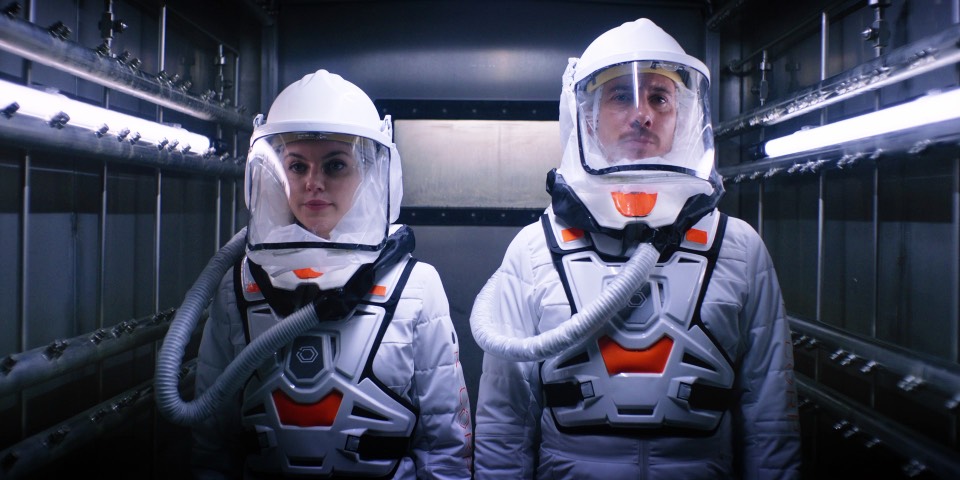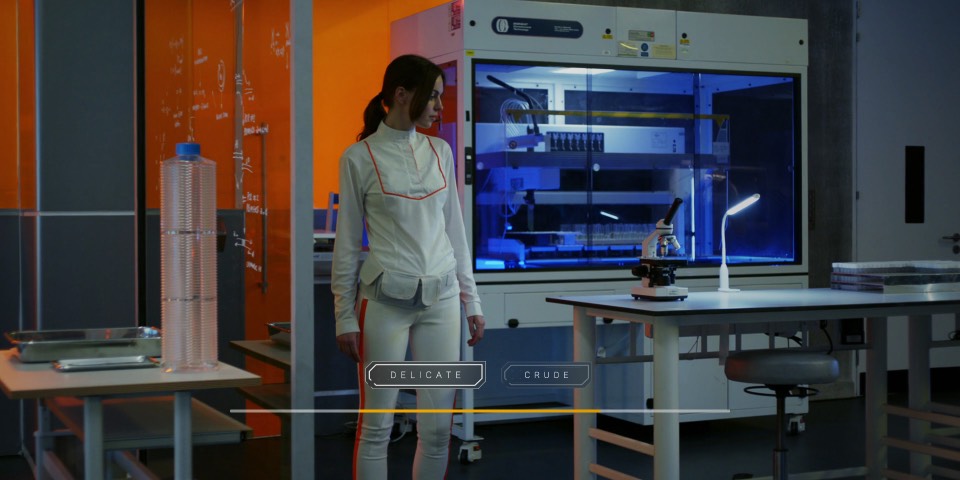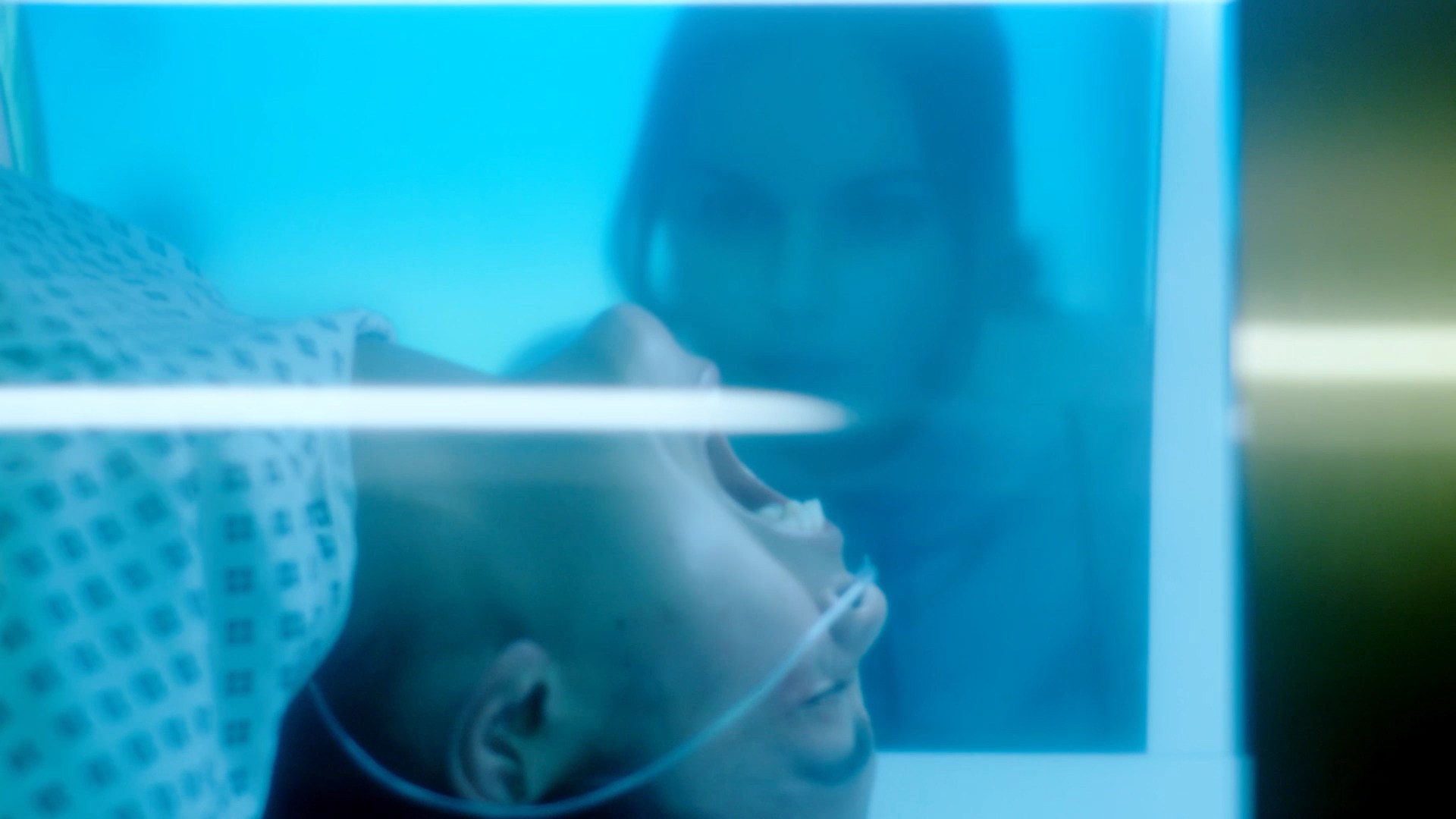Wales Interactive has become the leading publisher of full-motion video (FMV) games of late, and The Complex is their latest title. If you’re one of those people looking for a new game to provide a distraction from the stress of the current coronavirus situation, this interactive sci-fi thriller is probably not it. The subject matter might come too close to the bone for those affected by this global pandemic.
Dr Amy Tennant and her assistant, Rees Wakefield, are in an isolation tent on a remote beach in the totalitarian state of Kindar. Two villagers have been struck down by a deadly nerve agent. Amy has to save them, but supplies are low and tough decisions have to be made. The situation leaves a lasting impression on both of them. It’s here where most of the similarities between current events and the game’s plot end, but this brief scene may prove too much for those directly affected by coronavirus. You have been warned.
Fast forward several years. Amy is now a leading scientist at the Kensington Corporation and a key player in the creation of nanocell technology. She’s holding a meeting with investors to secure funding for her experiments. Meanwhile, a few miles away, a young woman begins vomiting blood on the London Underground. The incident bears all the hallmarks of a biological terrorist attack linked to Amy’s nanocells. With terrorists closing in, Amy and Rees find themselves locked down in a Kensington Corp laboratory with the victim. It’s up to them to find a way out of the titular Complex before they become victims too.
The Complex Review – Choose Your Own Film Adventure
As an interactive movie, there isn’t actually a lot for players to do in terms of gameplay. There are dozens of timed decisions to make throughout the game before those selections play out in new cutscenes based on your choices. If this sounds familiar, it’s because the formula was already used in previous Wales Interactive titles like the 2017 release Late Shift. Like that game, players must pay attention so they don’t miss an important choice because the game constantly keeps moving.
In everyday life, we’re constantly making decisions. Most are minor decisions, like what color socks we’re going to wear, but there are occasionally more major decisions to make too. While I’d hope you’re never in a situation of deciding who lives or dies, it’s just one of the many decisions Amy needs to make. Her path through the game will lead to one of eight main endings—or even the ninth hidden ending—and it might not be the positive outcome for which you were hoping; just like real life, then.
Those decisions don’t just affect the overall plot; they also affect Amy’s personality traits. She’ll receive scores in honesty, bravery, curiosity, intelligence, and sensitivity. These result in an overall personality assessment at the end of the game, but seem to have very little bearing on how the story plays out. What is more important is how Amy interacts with the other characters throughout the game. There are nine main supporting characters, from colleagues to innocent bystanders. Amy’s relationship with each of these is scored using a percentage—the higher the percentage, the better their relationship.
The game constantly tracks these percentages and they can be viewed at any time throughout the game. Keep an eye on them because these relationships affect the opportunities that Amy will get. Being abrupt with a character may mean they’re less likely to want to help you later on. If you run out of time before you can make a decision, the game will even use these relationships to pick the most fitting scenario to play out. If you don’t like it, that’s just tough unfortunately.
The Complex Review – Recognizable Faces
There are several recognizable faces amongst the cast, including Michelle Mylett (Letterkenny), Kate Dickie (Game of Thrones), and Al Weaver (Grantchester). Despite this talent, the acting at the start of the game can feel a bit hammy at times. Fortunately, the performances do get much better and more convincing as the story progresses. Players become genuinely invested in their fate and that of the victim, although whether they live or die depends on how sadistic you’re feeling.
The only real downside to the game is its length. At just 75 minutes for a full playthrough, it’s pretty short. It would even feel short if you were watching it as a film rather than playing a game. The game instead relies on players going back for the alternate endings. If you want to see every one of the game’s 200 cutscenes, the thought of nine full playthroughs might seem tortuous. The good news is you can skip all of the cutscenes you’ve previously viewed with R1, with the game halting only at decisions that need making. This cut my second playthrough down to 15 minutes, and that was with several pauses to check my relationship statuses.
Just like a proper movie, the game runs smoothly for the most part with seamless transitions between scenes. This wasn’t always the case in The Complex, though. Sometimes, after making a decision, there was a bit of jittering as the game loaded the correct cutscene. The story itself feels cohesive, it’s just that the game can’t always keep up. It’s an issue that was also seen in Late Shift three years ago, yet it’s still present today.
The timing of the release of The Complex is questionable considering the pandemic that’s currently sweeping the globe. Once you get over the similarities between reality and video game, the plot is a great if brief distraction for a lazy afternoon. It’s another smooth blend of movie and video game, even if there is more movie footage than gameplay, but this formula seems to be working well for Wales Interactive.
The Complex review code provided by publisher. Reviewed on PS4. For more information, please read our Review Policy.
-
Plenty of replayability with nine different endings
-
Character relationships make a real difference
-
Acting is generally good
-
Short length at just 75 minutes
-
Some stuttering between scenes










